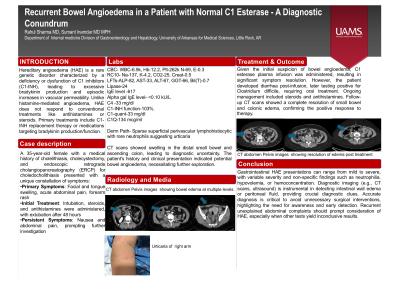Tuesday Poster Session
Category: Small Intestine
P5003 - Recurrent Bowel Angioedema in a Patient With Normal C1 Esterase: A Diagnostic Conundrum
Tuesday, October 29, 2024
10:30 AM - 4:00 PM ET
Location: Exhibit Hall E

Has Audio

Rahul Sharma, MD
University of Arkansas for Medical Sciences
Little Rock, AR
Presenting Author(s)
Rahul Sharma, MD, Sumant Inamdar, MD, MPH
University of Arkansas for Medical Sciences, Little Rock, AR
Introduction: Hereditary angioedema (HAE) is characterized by a bradykinin-mediated process due to deficiency or dysfunction of C1 inhibitors (C1-INH). This causes episodic vascular permeability increase due to excessive bradykinin production. Unlike histamine-mediated responses, HAE does not respond to standard treatments. Primary therapies involve C1-INH replacement or bradykinin production/function blockage.
Case Description/Methods: A 35-year-old female, with a history of cholelithiasis, cholecystectomy, and ERCP for choledocholithiasis, presented with facial and tongue swelling and acute abdominal pain despite a normal postop period. Intubation, steroids, and antihistamines were administered. Extubated after 48 hours, but persistent nausea prompted further investigations. Lab tests, including CBC, RC10, LFT, IGE, Alpha gal IGE, c3/c4 levels, C1-INH levels, and function were normal. Initial CT scans revealed distal small bowel and ascending colon swelling, complicating the diagnostic process. Despite normal complements, suspicion for bowel angioedema persisted due to the initial presentation. C1 esterase plasma infusion was initiated, resolving symptoms. Post-infusion, the patient developed diarrhea, testing positive for clostridium difficile, necessitating oral treatment. Steroids and antihistamines were continued. Subsequent CT scans showed complete resolution of small bowel and colonic edema.
Discussion: Gastrointestinal presentations in HAE vary in severity, and mild to moderate symptoms usually tend to resolve without complications. Severe presentations may show a generic elevation in neutrophils, hypovolemia, or hemoconcentration. While not specific to HAE, CT scans or ultrasound findings like intestinal wall edema or free peritoneal fluid can be sensitive and non-invasive to confirm the diagnosis. Distinguishing angioedema-related symptoms from unrelated processes is challenging, and misdiagnosis may result in unnecessary surgeries. Hence, recurrent abdominal complaints of unknown origin should prompt consideration of HAE in an appropriate clinical setting.

Disclosures:
Rahul Sharma, MD, Sumant Inamdar, MD, MPH. P5003 - Recurrent Bowel Angioedema in a Patient With Normal C1 Esterase: A Diagnostic Conundrum, ACG 2024 Annual Scientific Meeting Abstracts. Philadelphia, PA: American College of Gastroenterology.
University of Arkansas for Medical Sciences, Little Rock, AR
Introduction: Hereditary angioedema (HAE) is characterized by a bradykinin-mediated process due to deficiency or dysfunction of C1 inhibitors (C1-INH). This causes episodic vascular permeability increase due to excessive bradykinin production. Unlike histamine-mediated responses, HAE does not respond to standard treatments. Primary therapies involve C1-INH replacement or bradykinin production/function blockage.
Case Description/Methods: A 35-year-old female, with a history of cholelithiasis, cholecystectomy, and ERCP for choledocholithiasis, presented with facial and tongue swelling and acute abdominal pain despite a normal postop period. Intubation, steroids, and antihistamines were administered. Extubated after 48 hours, but persistent nausea prompted further investigations. Lab tests, including CBC, RC10, LFT, IGE, Alpha gal IGE, c3/c4 levels, C1-INH levels, and function were normal. Initial CT scans revealed distal small bowel and ascending colon swelling, complicating the diagnostic process. Despite normal complements, suspicion for bowel angioedema persisted due to the initial presentation. C1 esterase plasma infusion was initiated, resolving symptoms. Post-infusion, the patient developed diarrhea, testing positive for clostridium difficile, necessitating oral treatment. Steroids and antihistamines were continued. Subsequent CT scans showed complete resolution of small bowel and colonic edema.
Discussion: Gastrointestinal presentations in HAE vary in severity, and mild to moderate symptoms usually tend to resolve without complications. Severe presentations may show a generic elevation in neutrophils, hypovolemia, or hemoconcentration. While not specific to HAE, CT scans or ultrasound findings like intestinal wall edema or free peritoneal fluid can be sensitive and non-invasive to confirm the diagnosis. Distinguishing angioedema-related symptoms from unrelated processes is challenging, and misdiagnosis may result in unnecessary surgeries. Hence, recurrent abdominal complaints of unknown origin should prompt consideration of HAE in an appropriate clinical setting.

Figure: Before and after CT images with forearm rash on presentation.
Disclosures:
Rahul Sharma indicated no relevant financial relationships.
Sumant Inamdar indicated no relevant financial relationships.
Rahul Sharma, MD, Sumant Inamdar, MD, MPH. P5003 - Recurrent Bowel Angioedema in a Patient With Normal C1 Esterase: A Diagnostic Conundrum, ACG 2024 Annual Scientific Meeting Abstracts. Philadelphia, PA: American College of Gastroenterology.
